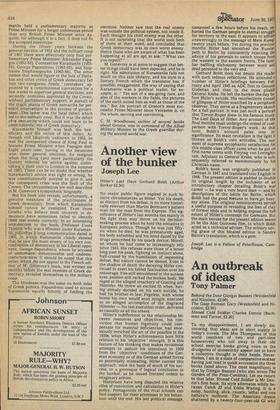Another view of the bunker
Joseph Lee
Hitler's Last Days Gerhard Boldt (Arthur Barker £2.50) No major public figure expired in such bizarre circumstances as Hitler. Yet his death, as distinct from his defeat, is no more historically relevant than Martin Bormann's patient wait for the man from the Express. The significance of Hitler's last months lies mainly in the light they may throw on his decisionmaking process when he held the initiative in European politics. Though he was just fiftysix when he died, he was prematurely aged, his body enfeebled and his mind dazed by the drugs prescribed by his quack doctor, Morell, on whom he had come to increasingly rely since 1943. His reflexes were those of a boxer long past his peak, fighting on instinct alone, half-crazed by the humiliation of impending defeat. But nature cannot be denied. Even in the shadow of death the decaying Hitler continued to exert his fabled fascination over his entourage. Fire still smouldered in the sunken eyes, passion still racked the broken body. He raged at the alleged treachery of Goering and Himmler. He threw an excited fit when, having already decided on his own suicide, he had his brother-in-law, Fegelein, with whose bones his own would soon mingle, executed as an alleged accomplice of the disgraced Himmler — his last execution order, delivered as casually as all the others.
Hitler's indifference to the relationship between resources and objectives, his conviction that human ingenuity could compensate for material deficiencies, had enor mously enriched the art of the possible in the 1930s, when Hitler's achievements bore little relation to his 'objective' strength. It is this feature of his thinking that makes revisionist attempts to deduce his intentions in 1939 from the ' objective ' conditions of the Ger man economy or of the German armed forces so potentially misleading. Hitler carried this approach, once the basis of much of his success, to a grotesque if logical conclusion in the bunker, as he issued frenzied orders to imaginary armies.
Historians have long disputed the relative ri5les of conviction and calculation in Hitler's policy. Protagonists of the rival schools can find support for their premisses in his behaviour until the end. His last political message, composed a few hours before his death, eg• horted the German people to eternal struggle for territory in the east. It appears to adhere unswervingly to the message of Mein Kampf twenty years before. Yet during the previous months Hitler had smoothed the Russian path to Berlin by consistently rejecting the advice of his generals to switch troops frotr the western to the eastern fronts. The farnt' liar baffling dichotomy between word and deed persisted to the very end.
Gerhard Boldt does not detain the reader with such tedious reflections. He attended 9 number of Hitler's briefings between Feb. ruary and April 1945 as ADC first to General Guderian and then to the more pliable General Krebs. He left the bunker the day be fore Hitler's suicide. His recollections consist of glimpses of Hitler snatched by a peripheral observer. They serve as a fragmentary sketch for a full portrait. It was just such a portrait that Trevor-Roper drew in his famous study, The Last Days of Hitler. Any account of the final months must undergo the ordeal of comparison with Trevor-Roper's work. At that level, Boldt's account pales into insignificance. Its main revelation is the light It throws on Boldt's own attitudes. The moment of supreme sycophantic satisfaction for this middle-class officer came when he got on first-name terms with Freytag von Loringhoven, Adjutant to General Krebs, who is subsequently referred to monotonously by his Christian name. •
Boldt's book was originally published in German in 1947 and translated into English in 1948. The present edition is padded to double its original length by the inclusion of an introductory chapter detailing Boldt's war career — he was a very brave man — and by descriptions of the battle for Berlin, which Boldt had the good fortune to have_on hearsay alone. The original reminiscences served a useful purpose in revealing the feet of clay of former idols and in helping expose the full extent of Hitler's contempt for Germans. But the main excuse for the present edition seems to be the Alec Guinness film, to which Boldt acted as a technical adviser. The solitary saving grace of this bloated edition is Sandra Bance's translation, which is a gem.
Joseph Lee is a Fellow of Peterho use, Cambridge


































 Previous page
Previous page